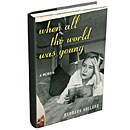In 2000, after a disastrous, heart-shattering break-up, I started reading Barbara Holland. Mostly, I read and reread One’s Company: Reflections on Living Alone, but I also read Bingo Night at the Fire Hall, which is Holland’s insightful and entertaining account—part memoir, part social criticism—of her move to tiny, rural Bluemont, Virginia. Around the same time, I was also reading May Sarton’s Journal of a Solitude (no two roughly contemporaneous writers could be more different than Holland and Sarton) and Joan Anderson’s A Year By the Sea. When I finished needing to read my way into my fantasies of spinsterhood, I put all these books away, and didn’t think much more about Holland until she died last month. I’ve been reading her again; she repays it.
During my Holland interregnum, she published When All the World Was Young, a memoir about her childhood in Bethesda in the 1930s and 1940s. As in Bingo Hall, there is a good bit of social criticism slipped in—of, among other things, the constraints on middle-class women’s lives. But mostly what distinguishes this childhood tale—and somehow lifts to transcendence themes that in another writer’s hands would have been boring and trite, such as Holland’s sense of alienation at school and her escape into reading—is her voice, her quirky, wry, starkly poetic voice. She also published The Joy of Drinking, in which she took up one of her favorite themes: Americans have become killjoys; we’ve banished as downright immoral all the true, simple pleasures of life, including the 5 o’clock cocktail. We’ve traded the martini for bottled water. This is to be mourned, writes Holland. “No major civilization ever arose from a land of water drinkers. No warm, cooperative sense of community ever sprang from neighbors sitting down together to drink water.”
Last night, I reread One’s Company. It’s not the place to start—it’s not as luminously wonderful as Bingo Hall and When All the World Was Young. In One’s Company, Holland occasionally veers toward advice (how best to take a vacation if you’re single), and it’s not a mode that suits her. Still, there are some fine moments, as when she surveys literature’s odes to solitude and determines that most of the people who wrote them spent very little time alone—and the hours of solitude they did log were voluntary: “Byron said, ‘There is rapture on the lonely shore, / There is society, where none intrudes”; but when you consider Byron’s hectic love life, he probably wasn’t standing on the beach ten minutes… . I’m not even sure he ever set foot on a lonely shore. Maybe someone told him about it.”
Tonight, quite alone in my little New Haven garret, I’ll raise a glass to Barbara Holland. I look forward to sharing a cocktail with her at the heavenly banquet.
Lauren Winner is an assistant professor at Duke Divinity School. For the academic year 2010-11, she is a visiting fellow at Yale’s Institute for Sacred Music. Her book A Cheerful and Comfortable Faith: Anglican Religious Practice in the Elite Households of Eighteenth-Century Virginia is out this month from Yale University Press.
Copyright © 2010 Books & Culture. Click for reprint information.










